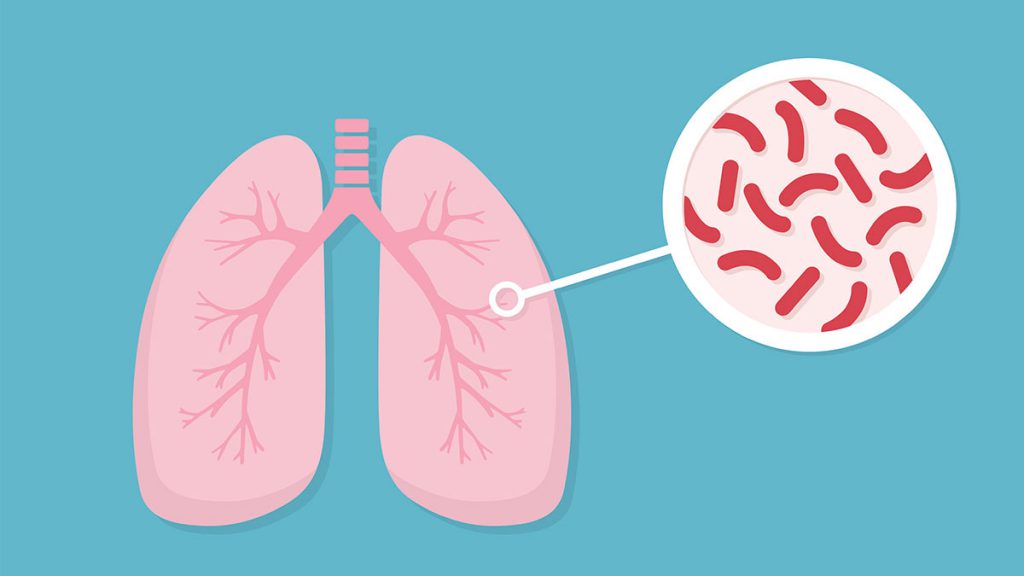
Nội dung bài viết / Table of Contents
This post is also available in: Tiếng Việt (Vietnamese)

Tuberculosis (TB) is a bacterial infection which attacks and destroys tissue. This bacterium named Mycobacterium tuberculosis (MTB) and it is transmitted through the air.
Many patients often suffer from tuberculosis dormancy, called latent tuberculosis. After a period of time depending on health of patients, possibly within a few weeks to a few years, TB bacteria begin cause to the symptoms.
Then TB appears. Especially if patients have weakened immune systems, such as HIV, cancer or chemotherapy, TB will develop faster. The disease usually affects lungs but it can spread to bones, lymph nodes, central nervous system, heart and other organs.
In some cases, the incubation period is shorter in patients with weakened immune systems. From stage of the disease has developed onwards, TB will become be easily transmitted. The following groups of people often suffer from or have high risk of tuberculosis, including:
In incubation period of TB, you often feel normal. Most patients have no symptoms at this stage and the disease does not spread. Once the disease has developed, the symptoms begin to appear.
Depending on which organs are affected, symptoms may include cough lasting at least 3 weeks, sputum or cough with blood, chest pain, fever, night sweats, weight loss, poor appetite, fatigue and weakness. The symptoms of TB may be caused by many other diseases related to lungs.
There may be some signs or symptoms not listed above. If you have any concerns about a symptom, please consult your doctor.
Please go to the doctor if you have fever, unexplained weight loss and night sweats. Especially if you have a persistent cough of 3 weeks, the risk of which is caused by TB. This is often a sign of tuberculosis, but it also can be a symptom of other diseases. Your doctor may conduct tests to help you determine the cause.
If you have any signs or symptoms listed above or have any questions, please consult with your doctor. Everyone’s body acts differently. It is always best to discuss with your doctor what is best for your situation.
It is caused by bacterium named Mycobacterium tuberculosis (MTB), which spreads through the air. That means you can breathe the air with bacteria due to close contact, inhalation of bacteria in the atmosphere where the disease spread by coughing.
After entering the body, the virus will be inactive but it would be in “sleeping” month of “sleeping”. This period is called incubation period. Because the virus is not active, there should be no symptoms and they are not contagious.
If you take the test, you will still have a positive result with this virus even though there are no signs at all. The risk of TB can be reduced significantly if it is detected early from this period.
However, in ten people infected MTB virus, there will be a person will develop the disease. Virus will attack the body when the immune system could not fight them, or the viruses wait until the immune system is weakened (as in the elderly, people living with HIV…).
So incubation period is different in each person. When it is launched, the virus will develop in the lungs and in the blood vessels and migrate to other parts of the body.
Certain factors may cause you to increase the risk of tuberculosis. The majority of cases of tuberculosis have weakened immune systems, including:
If there are no risk factors, it does not mean you cannot get sick. These signs are for reference only. You should consult a specialist doctor for more details.
The information provided is not a substitute for medical advice. ALWAYS consult your doctor.
The information provided is not a substitute for any medical advice. ALWAYS consult with your doctor for more information.
If you have unexplained, persistent cough, weight loss or fever, it might be caused by tuberculosis. Your doctor will ask about where you live, work and the people you contact in order to detect the source of infection of TB.
Or history of tuberculosis skin test results, the risk factors (especially HIV), foreign travel and outdoor work are some of the determinants of diagnosis.
The skin test reaction with elements of tuberculosis (PPD) can be carried out. For this test, a small amount of protein-containing TB bacteria is injected into the skin under your arms; swollen spot will be measured from 48-72 hours later.
The size of the swollen spot in injected location determines positive tuberculin skin test or not. A positive result usually means that the person has been infected with TB.
Your doctor can also take X-rays and sputum samples, blood or urine to check for the presence of virus MTB. HIV testing can be done.
Tuberculosis can be treated pretty easily. Usually, you must use medication for 6 months or longer. The proper treatment often involves 3 -4 daily antibiotics. You’ll feel better after a few weeks. However, the disease may still relapse.
It is important to complete course of treatment even if the symptoms disappear. If drugs are discontinued to use prematurely, the bacteria still remain in the body.
TB can come back, spread to other parts of the body and spread to others. Family members and those who have close contacts with you should be tested.
The following lifestyles and home remedies might help you cope with this disease:
If you have any questions, please consult with your doctor to better understand the best solution for you.
Read more post: